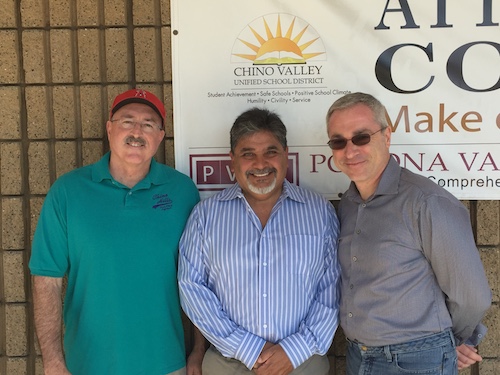Plaintiffs Michael Anderson, Larry Madonado and attorney David J.P. Kaloyanides, along with FFRF and 20 other plaintiffs, won a lawsuit against the Chino Valley School District in February 2016, stopping prayers during board meetings.
The Freedom From Religion Foundation is asking the 9th U.S. Circuit Court of Appeals to uphold a lower court ruling against prayer at meetings of a California school board.
A district court in February 2016 granted summary judgment in favor of FFRF and its 22 plaintiffs, declaring school board prayer in Chino Valley District, Calif., an unconstitutional government endorsement of religion. The decision by U.S. District Judge Jesus G. Bernal, Central District of California, also ruled the school board policy and custom of reciting prayers, bible readings and proselytizing violated the Establishment Clause of the First Amendment.
FFRF filed its lawsuit in November 2014. After FFRF won at the district court level, the school board voted to appeal the decision in a controversial 3-2 vote at a contentious meeting. On March 31, 2016, the court ordered the district to pay more than $200,000 in attorney’s fees and costs.
The board did not contest the other religious conduct in which the school board members engaged, including bible recitation and readings, religious commentary on social and political matters, and proselytizing at the school board meetings. For example, board member James Na told the audience at one meeting that “God appointed us to be here.” He also told an audience:
Man, as we were born is flawed. We’re not complete. We’re not God. . . Pastor Frank Gonzalez was right in his prayers, that I need [to] first look up to Jesus Christ for serving our students…because without that, we’ll be flawed just like those judges in superior court or on the local bench.
The purpose behind hosting prayers, reading from the bible, and proselytizing is apparently, as Na stated at one meeting, to “urge[] everyone who does not know Jesus Christ to go and find Him.”
Another board member, Andrew Cruz, told the audience at a meeting that the board had a goal: “And that one goal is under God, Jesus Christ.” Cruz then read from the bible, Psalm 143:8.
Chino Valley Board meetings feature adults — board members, staff, or clergy — nearly always Christian, delivering a prayer. And those prayers are imposed on students. The board includes a student representative. Students are invited to lead the Pledge of Allegiance, and they and their parents often have cause to attend board meetings.
The school board argues that it is similar to a legislative board, thereby invoking two decisions by the U.S. Supreme Court that permit, under narrow circumstances, governmental prayer.
“By attempting to reframe the nature, purpose, and function of a public school board, the school board members in this appeal try to squeeze themselves into the narrow exception of legislative prayer,” writes FFRF.
“The meetings of the school board can only be seen as school functions. Appellant school board members here are not a legislative body but rather a specific type of governing body tasked with one and only one duty: to govern all aspects of the public schools for the benefit and well-being of the children who are students within their district,” FFRF’s brief states. Both the 3rd and 6th Circuit Courts of Appeal have prohibited prayer at school board meetings. Only the 5th Circuit, in the recent McCarty decision, a challenge brought by the American Humanist Association, has ruled otherwise. In that narrow case, the school board in Birdville, Texas, actually dropped prayers in favor of an unregulated student statement following a challenge.
FFRF notes the board’s policies and practices have no secular purpose and act to unconstitutionally endorse religion.
“We’re confident that the 9th Circuit will firmly agree with us,” says FFRF Co-President Dan Barker. “Public school boards exist to oversee secular education, and must protect rights of students and their parents by keeping religious devotions and divisiveness out of official school board functions.”
Barker observes that FFRF, a state/church watchdog with more than 29,000 nonreligious members, including over 3,500 in California, had the unprecedented experience of having to turn away plaintiffs. “Many parents, students and community members came to us seeking help to curb the religious acrimony created by school board members who are misusing their civil authority to promote their personal religious views,” he says.
Public opinion and the law are both with the Freedom From Religion Foundation in Chino Valley.
FFRF v. Chino Valley Unified School District has Case No.: EDCV 14-2336-JGB (DTBx). The brief on behalf of FFRF and its plaintiffs was written by litigation attorney David J.P. Kaloyanides, and FFRF Staff Attorneys Andrew L. Seidel and Rebecca Markert, serving as co-counsel.


